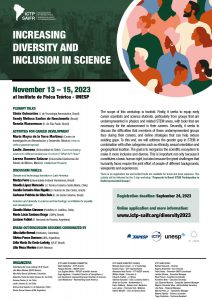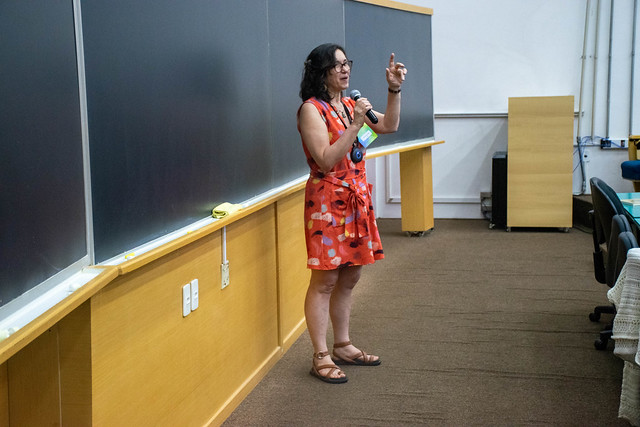Increasing Diversity and Inclusion in Science
November 13 – 15, 2023
São Paulo, Brazil
ICTP-SAIFR/IFT-UNESP

Home
The scope of this workshop is twofold. Firstly, it seeks to equip early career scientists and science students, particularly from groups that are underrepresented in physics and related STEM areas, with tools that are necessary for the advancement in their careers. Secondly, it seeks to discuss the difficulties that members of these underrepresented groups face during their careers, and define strategies that can help reduce existing gaps. To this end, we will address the gender gap in STEM in combination with other categories such as ethnicity, sexual orientation and geographical location. The goal is to reorganize the scientific ecosystem to make it more inclusive and diverse. This is important not only because it constitutes a basic human right, but also because the great challenges that humanity faces require the joint effort of people of different backgrounds, viewpoints, and experiences.
During the three-day workshop we will have:
- Plenary talks by researchers at different stages of their careers combining a description of their research and their lives.
- Two hands-on activities and a talk to give tools for career development.
- Discussion panels on “Gender and technology transition in Latin America” and “Inclusion and diversity in science and technology: an initiative for equality and development”.
- Poster session.
- Discussion sessions with the final goal of producing a list of recommendations.
This activity will be followed by the two-day workshop “Proposals to Boost STEM Participation in Underrepresented Groups“. There is no registration fee and limited funds are available for travel and local expenses.
Organizers:
- Zélia Maria Da Costa Ludwig (UFJF, Brazil)
- Lilia Meza Montes (BUAP, Mexico)
- Alba Avila-Bernal (UniAndes, Colombia)
- Alejandra Paola Gonzalez Vasquez (Universidad de Chile)
- Denisse Pasten (Universidad de Chile)
- Leslie Jiménez (Universidad de Chile)
- Andrea Vera Gajardo (Universidad de Valparaíso, Chile)
- Silvina Ponce Dawson (UBA, Argentina)
List of Participants: Updated on November 16, 2023.
Survey: HERE.
Speakers, Coordinators and Panelists
Plenary talks by researchers at different stages of their careers:
- Sônia Guimarães (Instituto de Tecnologia Aeronáutica, Brazil): My Journey, Advocacy Work to Improve Brazilian Scientists Diversity
- Sendy Melissa Santos do Nascimento (Brazil): Women in Colors
- Renata Wasserman (Universidade de São Paulo, Brazil): Women in CS and IA: A personal perspective
Activities for career development:
Hands-on
- María Mayra de la Torre Martínez (Centro de Investigación en Alimentación y Desarrollo, Mexico): How to write a paper/proposal
- Leslie Jimenez (Universidad de Chile): Communicating science to different audiences: to whom? What for? How?
Talk
- Lorena Romero Salazar (Universidad Autónoma del Estado de México, Mexico): Intellectual Property
Discussion panels:
1.Gender and technology transition in Latin America
- Mariza Ferro (Universidade Federal Fluminense, Brazil)
- Claudia López Moncada (Universidad Técnica Federico Santa María, Chile)
- Camila Carneiro Dias Rigolin (Universidade Federal de São Carlos, Brazil)
- Carleane Patricia da Silva Reis (Universidade de Santa Catarina, Brazil)
2.Inclusion and diversity in science and technology: an initiative for equality and development
- Claudia Matus Cánovas (Pontificia Universidad Católica, Chile)
- Maria Lúcia Santana Braga (CNPq, Brazil)
- Luciano Fabbri (Universidad Nacional de Rosario, Argentina)
Poster sessions
Discussion sessions coordinated by the organizers, Alba Avila Bernal, Lilia Meza Montes, Zélia Maria Da Costa Ludwig and Silvina Ponce Dawson
Registration
Program
Download program: Here
Videos and Files
- 09:30 - Sendy Melissa Santos do Nascimento (Brazil): Women in Colors
- 11:00 - María Mayra de la Torre Martínez (Centro de Investigación en Alimentación y Desarrollo, Mexico): How to write a paper/proposal
-
14:00 - Leslie Jimenez (Universidad de Chile):
Communicating science to different audiences: to whom? What for? How?
- 09:00 - Sônia Guimarães (Instituto de Tecnologia Aeronáutica, Brazil): My Journey, Advocacy Work to Improve Brazilian Scientists Diversity
- 11:00 - Zélia Maria Da Costa Ludwig (UFJF, Brazil): Panel 2: Inclusion and diversity in science and technology: an initiative for equality and development.
-
09:00 - Renata Wasserman (Universidade de São Paulo, Brazil):
women in CS and IA: A personal perspective
-
10:30 - Alba Avila-Bernal (UniAndes, Colombia):
Panel 1, Gender and technology transition in Latin America.
- 14:00 - Silvina Ponce Dawson (UBA): Increasing diversity and inclusion in science: main conclusions of the Workshop and possible future actions
- 15:30 - Lorena Romero Salazar (Universidad Autónoma del Estado de México, Mexico): Intellectual Property
asdasdasd
Photos
Posters
Poster Session 1 (Monday, November 13)
- ALEJANDRO MURILLO ORREGO (Antioquia University): Breaking Barriers: Inclusion and Diversity in STEM
- Alessandra de Souza Barbosa (Departamento de Física, Universidade Federal do Paraná): SCIENCE OUTREACH ON THE FEMALE NOBEL LAUREATES IN PHYSICS AND THE EDUCATION FOR SUSTAINABILITY
- ALICIA GROTH BECKER (Universidade Federal de Santa Maria): MATHEMATICAL MODELING OF THE CELLULAR ANGIOGENESIS PROCESS: INFLUENCE OF SHEAR STRESS AND THE EXTRACELLULAR MATRIX.
- Angela Stella Camacho Beltrán (Colombian academy of exact physical and natural sciences): The Colombian Network of Women Scientists
- Barry Iyare (University of Johannesburg): A computational fluid dynamics study of the infectiousness decay of droplets propagating pathogens when exposed to evaporation coupled with UVGI
- Brenda (Universidad Autonoma metropolitana): El modelo de ModMax y Barden / La doble copia de las métricas tipo Bianchi.
- Camila Sedofeito (Universidad de la República): Gender inequalities in the trajectory of the Bachelor ‘s degree in Physics in Uruguay
- Camilla Oliveira (Physics Department – Federal University of Paraná): Presenting the project: Outreach Project on Women in Science – Meninas e Mulheres nas Ciências UFPR
- Cássio Luís Pires Lucato (USP): Manganese oxide and Manganese Antimonates as electrocatalysts for water oxidation reaction and electrochemical reforming of organic compounds in acid media
- César Martín Agurto Castillo (Universidad Nacional de Piura – Perú): Inteligencia emocional
- Clemencia Mora Herrera (Universidade do Estado do Rio de Janeiro): Diversity and Inclusion in the CMS Collaboration
- Denisse (University of Chile): Study of Complex Networks for the 2014 Iquique Earthquake
- Elsa Ruth Espinoza Orozco (Univerdad Nacional Autónoma de Nicaragua, UNAN Managua): Procesos Geodinámicos de los hidrotermales de Teustepe.
- Erika Guetti Suca (University of São Paulo): Towards to a model for ontology-based privacy management in Health Systems using Differential Privacy
- Evelyn Rondon Jara (Universidad Privada del Norte): Women’s participation in patent development: Peruvian context
- Félix Napoleón Díaz Desposorio (Universidad Autónoma del Perú): The vital role of basic physics education in STEM careers.
- Harold Buenvenida (Capiz State University): Inclusive Green Futures: Women in Agriculture, Conservation, and Citizen Science for Climate Innovation and Gender Equity
- Harshit Prabhu Reshmi (Hindu college, University of Delhi): A Study of Electro-Optic Properties of a single crystal of Pure Triglycine Sulphate (TGS)
Poster Session 2 (Tuesday, November 14)
- Huyra Estevao de Araujo (Federal Institute of Education Science and Technology of Sao Paulo (IFSP)): CeraMina-CeraMana- An experience of diversity in STEM through Materials Science
- Juan Pedrosa (Universidad Nacional de Hurlingham): Impacto de las becas académcas de mujeres en igeniería
- JULIA VITORIA RIBEIRO (UFSM): MATHEMATICAL MODELING OF THE DIFFERENTIATION OF TIP AND STALK CELLS IN THE ANGIOGENESIS PROCESS
- Julián Gelabert (National University of Rosario): Increasing Diversity and Inclusion in STEM: Challenges and Opportunities
- Jyoti U. Devkota (Department of Mathematics, Kathmandu University, Nepal): Statistical Analysis of Gender Gap in Education and Employment – with Examples from Nepal
- Katharine Ivette Cuba Quispe (Universidad Nacional de Trujillo): Trajectories and challenges: an analysis of the participation of Peruvian physicists in research and teaching in the last decade
- Laura Morales (INFINA): COVID – Pandemics at the Physics Department in UBA
- Luciana Renata de Oliveira (Universidade Federal de Santa Maria): Pop Science – An altermative for science communication and inclusion
- Luz Ángela García (Universidad ECCI): Encouraging young women to approach astronomy in Colombia
- Luz Elena Gonzalez (PIT Policy Lab): Mainstreaming Gender Perspective in AI crowd work in the Global South
- M Victoria Cano Colazo (IIF/SADAF/CONICET): Implementación de mecanismos para garantizar la eliminación de las desigualdades de género a fin de lograr la conciliación entre la vida privada y profesional de las investigadoras del CONICET.
- Matheus dos Santos Barbosa da Silva (University of Sao Paulo/Sao Carlos Institute of Chemistry): A life-story investigation of gender and sexual minority STEM graduate students’ gendered narratives of becoming in science
- Michele Bertoldo Coêlho (UFRGS): SMARTY: The mileS geMini neAr infRared sTellar librarY
- Monday Sunday ADIAHA (Nigeria Institute of Soil Science (NISS) https://niss.gov.ng/): Embracing Diversity and Inclusion in STEM: Fostering Innovation and Advancement
- Myrna Elis Ferreira Santos (Federal University of Alagoas): Barriers faced by Brazilian ecologists
- P. Zamora Dávila (Yachay Tech): Intersectional network characterization of gender-etnic gaps in universities.
- SARA ALEJANDRA CARVAJAL RAMIREZ (Universidad de Antioquia): The role of gender collectives and science outreach groups in redefining women’s role in science in Colombia
- Silas Michael Batista Guedes (University of São Paulo): Narratives in Physics: Oppressions experienced by underrepresented segments of IFUSP students
- Tamara Díaz Chang (Instituto de Ciencias Físicas y Matemáticas): Women in Math: Breaking the Mold
- Wilma Ticona Chambi (Universidad Mayor de San Andres): Structural characterization of Bolivia´s Clays for application as traditional medicine
- Rayanna Vieira (UFS): Inspirational biographies of UFS researchers on Wikipedia
- Débora Thaís (UFS): Affirmative action for female physics students
The posters will be displayed on the mezzanine level.
Participants who are presenting a poster MUST BRING A PRINTED BANNER. For details about the poster presentation, please, look at the correspondent Additional Information topic.
Updated: October 31, 2023.
Additional Information
BOARDING PASS: All participants, whose travel has been provided or will be reimbursed by ICTP-SAIFR, should bring the boarding pass upon registration. The return boarding pass (PDF, if online check-in, scan or picture, if physical) should be sent by e-mail to secretary@ictp-saifr.org
Poster presentation: Participants who are presenting a posterMUST BRING A BANNER PRINTED. The banner size should be at most 1 m (width) x 1,5 m (length). We do not accept A4 or A3 paper. Click here to see what a banner looks like: http://designplast.ind.br/produtos/detalhe/impressao-digital/banner/119/9
COVID-19: Brazilians and foreigners no longer have to present proof of vaccination before entering the country.
Visa information: Nationals from several countries in Latin America and Europe are exempt from tourist visa. Nationals from Australia, Canada and USA need a tourist visa starting from until January 10, 2024. Please check here which nationals need a tourist visa to enter Brazil.
Accommodation: Participants, whose accommodation will be provided by the institute, will stay at The Universe Flat. Hotel recommendations are available here.
How to reach the Institute: The school will be held at ICTP South American Institute, located at IFT-UNESP, which is across the street from a major bus and subway terminal (Terminal Barra Funda). The address which is closer to the entrance of the IFT-UNESP building is R. Jornalista Aloysio Biondi, 120 – Barra Funda, São Paulo. The easiest way to reach us is by subway or bus, please find instructions here.

